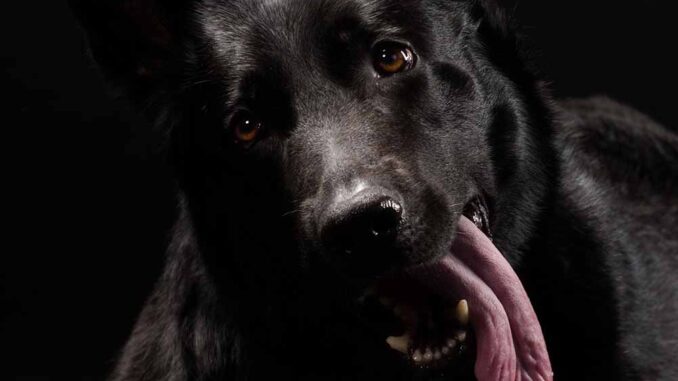
This article was updated on November 30th, 2023

In this article, our veterinary team here at Senior Tail Waggers shares the top reasons why older dogs suddenly start panting at night, along with advice on what to do to help.
Key highlights:
– Excessive panting at night could be an indication of a serious medical issue
– More severe causes of panting include heat stroke, respiratory issues, Cushing’s disease, heart disease, or pain
– Panting is also sometimes a sign of anxiety
– Contact your veterinarian if your dog isn’t particularly active but still heavily panting
– In some cases, home remedies like creating a calm environment, cooling your dog down, or exercise can help
4 things you should know when your senior dog is panting at night:
1. Excessive panting at night could be an indication of a serious medical issue
Panting is normal for dogs to regulate their body temperature when hot or exhausted. However, panting at night in senior dogs is concerning:
“If your dog is excessively panting at night, especially when they are not active, you should be concerned as this could be an indication of a serious medical issue. It could be a sign of pain, heatstroke, respiratory or heart disease or anxiety. Additionally, excessive panting in older dogs can lead to other health problems due to the lack of restful sleep.”
2. Top 6 reasons older dogs pant at night, according to our veterinarians
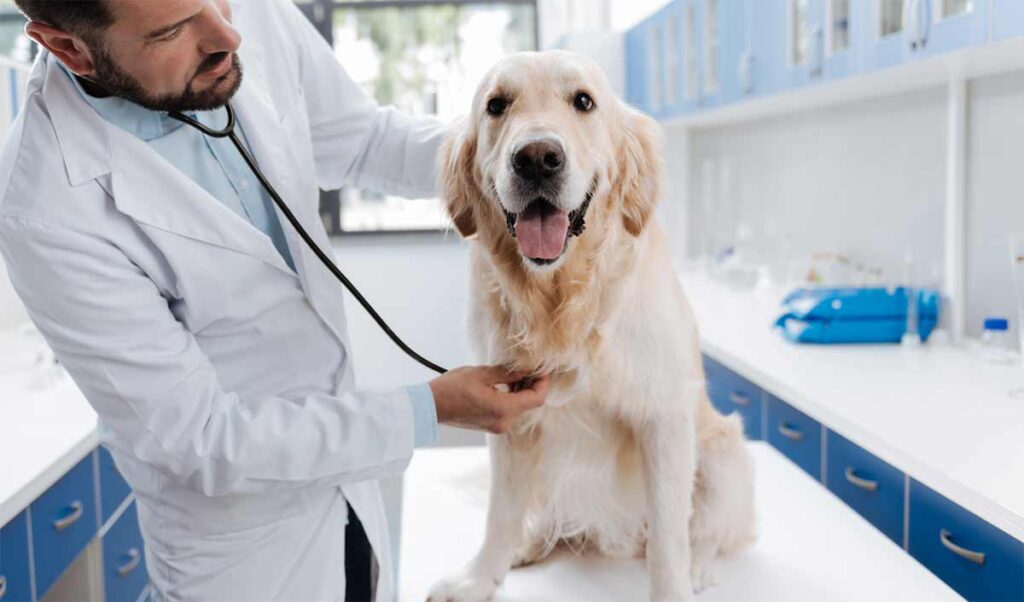
So, why do dogs pant at night? There are many possible reasons. While some are natural or hereditary, others can mean serious trouble for your dog’s health. The top reasons include:
1. Heatstroke
Extremely hot weather can cause heatstroke in dogs and can be one possible reason for your old dog’s panting. Keep your dog away from the sun during the day and well-hydrated to prevent heatstroke.
Symptoms: A dog suffering from heatstroke will pant abnormally, have red gums, body temperature over 104, increased heart rate, and abnormal thirst. As seriousness increases, dogs can be wobbly, have glazed eyes, or even start having seizures. Heatstroke can be quite serious and cause life-threatening problems: up to 3 in 10 dogs suffering from heatstroke will die.
How to treat: Move your dog to a cooler part of the house, pour some cool (but not cold) water over them, and give them ice cubes to lick. A fan can be a great help in cooling them down once you’ve wet their fur. If they are showing any serious signs, take them to a veterinary clinic immediately.
2. Respiratory issues
A senior dog panting at night could be suffering from respiratory distress. It could be pneumonia or other pulmonary diseases.
Symptoms: Aside from panting, you might notice coughing, difficulty breathing, and lethargy. Respiratory issues are serious and can worsen if not treated quickly.
How to treat: If your dog’s panting could be related to respiratory problems, they need to see a veterinarian.
3. Cushing’s disease
Cushing’s disease is an adrenal disease in which a dog’s adrenal glands produce too much cortisol—a stress hormone. Your dog could be panting at night due to Cushing’s disease.
Symptoms: Symptoms include excessive panting and shaking, increased thirst, increased urination, hair loss, and a potbelly.
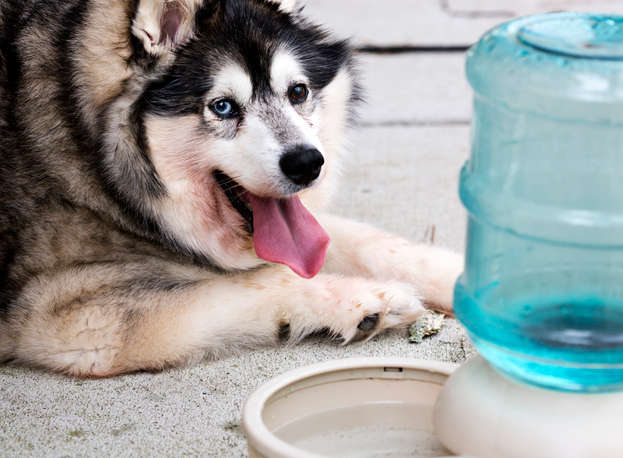
How to treat: Cushing’s will continue to worsen without medication. You’ll need to take your dog to the vet for blood tests in order to get a diagnosis and regularly check that the medication is working as expected. Cushing’s disease has no cure, unfortunately, but the symptoms can be managed. View more pictures of dogs with cushing’s disease & learn more about treatments.
4. Pain
Pain could also be a reason for your dog’s panting at night. This is especially likely if they are restless and grumpy.
Symptoms: Agitation, growling, hiding, shallow breathing, and an increased heart rate are all signs of pain in dogs. However, some dogs won’t show any signs of pain other than panting more.
How to treat: Once your vet has worked out why your dog is in pain, they can prescribe suitable pain relief. Do not use OTC pain relief for dogs—not only are many toxic to dogs, but senior dogs are more prone to underlying conditions that can make these treatments more dangerous. For instance, liver changes are common in senior dogs, and these can make Tylenol a dangerous choice.
Learn how to manage pain in older dogs or read our article “Is my senior dog in pain?”.
5. Heart disease
Cardiovascular disease can also be the reason behind your senior dog panting at night. Old dogs are at greater risk of heart disease, and it can affect all breeds.
Symptoms: Symptoms of heart disease in dogs include:
- dry coughing,
- shortness of breath,
- restlessness,
- rapid weight loss, and
- fatigue.
Your veterinarian will need to listen to your dog’s heart and may recommend an echocardiogram (ultrasound) or an x-ray to help determine the exact problem.
How to treat: Although heart disease is serious, many treatment options are available to increase the quality of life. Contact your vet for a detailed diagnosis and treatment plan. Avoid high-salt foods and strenuous exercise and do your best to make your longtime canine companion comfortable. Learn more about heart disease in older dogs.
6. Stress and anxiety
Stress can manifest as panting in dogs and must be appropriately managed. An old dog panting and pacing at night can be suffering from anxiety.
Symptoms:
“A dog panting due to anxiety will also pace, bark, shiver, hide, or destroy furniture. You might spot other behavioral changes if your dog is stressed. Stress and anxiety in dogs are quite common but should be carefully managed and treated to protect your dog’s quality of life.”
How to treat: Calm an anxious dog through massage, gentle petting, and physical exercise. Use mental and physical stimulation, consistent routines, and supplementation to reduce stress. You may need to talk to your veterinarian about prescription medication or to a behaviorist for further advice. Learn more about senior dog anxiety and natural remedies to help with anxiety.
3. After ruling out underlying conditions with your vet, these 3 home remedies may help
The first step is to talk to your veterinarian to identify any potential underlying condition. Once medical conditions have been ruled out, the following tips can help calm a panting dog:
1. Create a calming environment
Reduce stress and anxiety by consciously creating a calming environment.
“Senior dogs’ needs change as they get older, and you must adjust accordingly to keep them as comfortable and relaxed as possible. If your senior dog is the anxious type, be sure to give them a safe space to retreat to when anxious or stressed.”
2. Make sure your dog isn’t hot
Dogs normally pant to cool down. If your dog is panting at night, make sure they are not too hot and move their bed to a cooler location. If they are sleeping in the hotter part of your house, move them to a cooler place and give them cool water to drink.
You can further reduce the risk of heatstroke by giving your old dog an ice cube with their favorite treat inside, a damp towel to lay on, and access to cool water.
3. Regular exercise
Regular exercise is an excellent way to reduce panting due to stress, anxiety, and pent-up frustration. Take your old friend on long walks, increase their playtime, and get them more dog toys so they have an outlet for all that extra energy. Take extra care to provide sufficient mental stimulation in addition to physical workouts. You can offer this stimulation by letting him sniff and explore on walks, getting some puzzle toys, or teaching them new tricks. Read our article about exercising older dogs safely.
4. Take your dog to the vet if they are panting at night in a cool environment while at rest
While panting is perfectly normal when a dog is hot or exhausted, excessive panting at night when they are not active can be a cause for concern. However, if that doesn’t seem to be the reason, they might have an underlying medical condition. Take them to the vet for an accurate diagnosis and start the treatment immediately.
Learn more about senior dogs panting excessively.
Learn more about panting in dogs from our veterinarians
Disclaimer: This website's content is not a substitute for veterinary care. Always consult with your veterinarian for healthcare decisions. Read More.


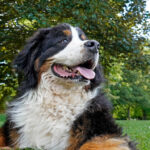
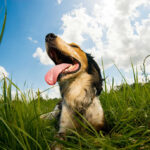
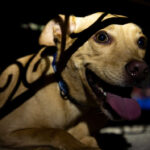
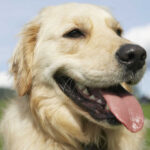
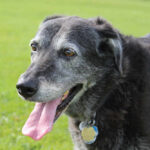

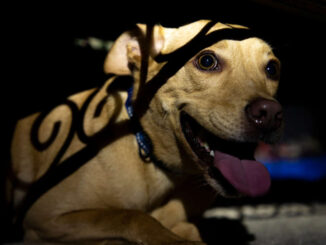

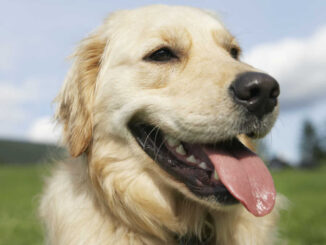
Thank you for this informative post! I’ve been worried about my old dog’s nighttime panting, and it’s comforting to know there can be multiple reasons behind it. I appreciate the tips on how to manage the situation and will definitely be looking into a vet check-up soon!
Thank you for this informative post! I’ve noticed my older dog panting at night lately, and it’s been worrying me. The tips you provided on evaluating their environment and checking for health issues are really helpful. I’ll definitely be more mindful of his comfort and make an appointment with our vet if it continues.
Thank you for sharing such valuable insights! I’ve been worried about my older dog’s nighttime panting, and your tips on monitoring his environment and health really helped. I’ll definitely be more attentive and consider visiting the vet if it continues. Appreciate the advice!
Thank you for this insightful post! It’s reassuring to know that panting can be a common issue in older dogs. I’m definitely going to keep an eye on my dog’s behavior and consult our vet if it continues. The tips on creating a calm environment are especially helpful!
Thank you for this insightful post! It’s comforting to know that panting can be a common issue for older dogs. I’ll definitely keep an eye on my pup and consult our vet if it continues. Appreciate the tips on creating a calming environment!
Thank you for this informative post! I’ve been worried about my senior dog’s nighttime panting, and it’s helpful to understand potential causes and solutions. I’ll definitely consider scheduling a vet visit to address this.